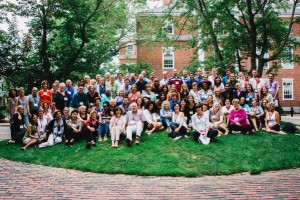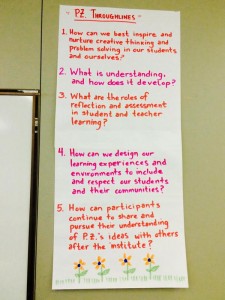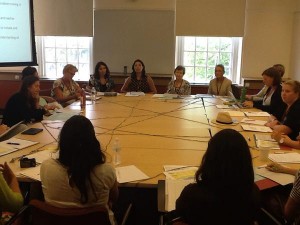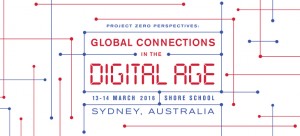PZC faculty – Image credit: @JimReesePZ
Last week I worked as faculty at the Project Zero Classroom at Harvard Graduate School of Education. Project Zero studies human learning and knowledge, and pushes thinking further with a focus on arts and creativity. Here is a short animation What is PZ? that gives some more information.
Howard Gardner opened PZC claiming that the US has too much influence on world education through excessive testing and ranking, and Project Zero is ready to help people have a broader view of learning and ethics. Daniel Wilson then claimed that Project Zero has a very provocative view of learning, suggesting that education has not come far since Jean Marc Cote’s 1899 vision of education in the Year 2000, and he pleaded with participants to not be seduced by the transmission model.
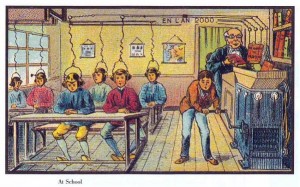 The Project Zero Classroom has five throughlines. These are big, important questions to keep in mind and reflect on during the institute:
The Project Zero Classroom has five throughlines. These are big, important questions to keep in mind and reflect on during the institute:
Image credit: @maryannesacco
My role was to co-lead a Study Group. Study Groups are like a home base for institute participants to synthesise and personalise information from the plenary sessions and mini-courses. Our role was to facilitate the learning process and let the participants’ interests and passions guide much of the session. This led to deep conversations about thinking dispositions, cultures of thinking, Reggio, active learning, and documentation.
Two PZC highlights for me were listening to Daniel Wilson talk about Making Learning and Learners Visible and being invited to present during Tina Blythe’s mini-course on Protocols for Professional Conversations.
Daniel spoke about how underneath our practices are a particular set of beliefs. Powerful learning moments open up complex windows into seeing who learners are and what they come to know – windows of identity and windows of cognition. He cited John Seely Brown, saying it is not about stuff, it is about creating opportunities for students to become, and he showed this video: The Amazing Circus Act. Learners and learning remain largely invisible in most schools because of time, standardised assessments, ambiguity, and incoherent beliefs and practices. Daniel spoke about learning portraits – what beliefs about teaching and learning do you see in action in this classroom? Learning is…? People who make learning and learners visible believe learning is purposeful, social, representational, empowering, and emotional. He then went on to discuss key teacher moves in documentation: being curious about noticing, intentional inquiry, collecting artifacts for group memory, engaging in reflection that informs teaching and learning, making connections across classrooms, and creating public exhibitions.
Tina modelled the facilitation of professional conversations with protocols (structures for guiding a conversation). Protocols are tools for the work of supporting teacher and student learning. They create opportunities for conversations about teaching and learning and support interactions that enable us to develop our understanding of a variety of perspectives. I presented a dilemma for the group to analyse through a consultancy protocol.
While there are many thinkers cited during PZC, three quotes regularly rise above the others:
“Understanding is a consequence of thinking” (David Perkins).
“We do not learn from experience… we learn from reflecting on experience” (John Dewey).
“Children grow into the intellectual life around them” (Lev Vygotsky).
PZC concluded with David Perkins advising participants how to create lasting change. A key message was to invite rather than advocate.
Project Zero Sydney 2016
Inspired by the success of Reggio spreading from Italy, Project Zero is now building up networks around the world and our school will be hosting the Project Zero Sydney conference on 13th and 14th March 2016. The event will be a magnet for educators from around Australia.
The focus is on the opportunities and challenges facing educators in the Digital Age. Young people are connected to one another around the globe in ways unimaginable just 20 years ago. How we respond will influence the level of civic engagement, the ethics and the intellectual curiosity of an entire generation. Do we continue on with a traditional curriculum, ignoring forces in the wider world, or do we meet the challenge head-on and shape it in ways that will be both rigorous and relevant? Using the theme “Global Connections in the Digital Age”, this two-day conference will feature keynote addresses by prominent Project Zero researchers who have been exploring questions such as:
- How do we educate for the unknown?
- With an abundance of knowledge now available to students at their fingertips via the internet, how do we shift teaching practices from a model of knowledge transmission to one of developing certain dispositions that transcend subject areas and other boundaries?
- In our fast-paced world, how do we slow the learning down and focus on depth, not breadth?
In addition, renowned educators and educational researchers from around the world will lead interactive courses and special interest sessions on these topics and more, such as how to make learning and thinking visible, how to teach for understanding, and what school leadership looks like that supports deep learning. These sessions will provide practical and relevant ways to help young people make important connections—to curriculum, to the world beyond the classroom walls, to their peers, and to their teachers.
The Project Zero team includes leading researchers, writers and thinkers in the field of teaching and learning. Their interests include investigations into the nature of intelligence, understanding, thinking, creativity, ethics and other essential aspects of human learning. The professional learning from Project Zero has proven to be transformative for teachers and has direct, practical and powerful application in the classroom.
Throughout this two-day conference, in major talks, interactive courses and special interest sessions, prominent Project Zero researchers–such as Carrie James, David Perkins, Ron Ritchhart, Shari Tishman and Daniel Wilson–and educators from around the world will examine the importance of the conference strands in the education of our students today and tomorrow.
PZ Sydney promises to be one of the best educational events Australia has ever witnessed.
